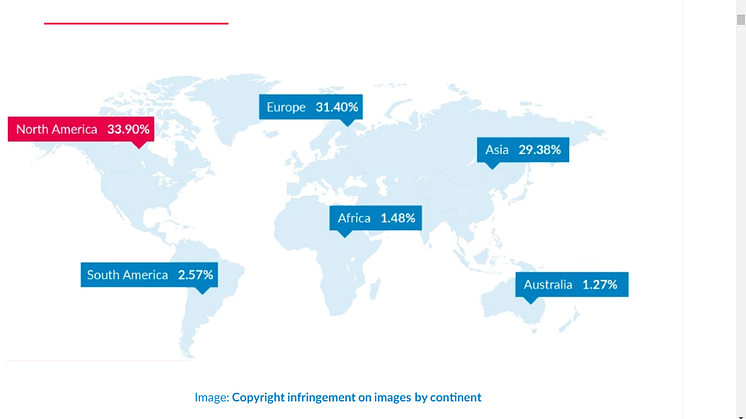
News -
2.5 billion images stolen a day last year - Copytrack
While we at PitchMark know that a lot of images are used online without a valid license, we were surprised to find out that more than 2.5 billion images are stolen online daily.
This is according to a report by image rights enforcement company Copytrack. Based on its analysis, Copytrack estimates that with the amount of stolen images, potential daily damages are up 532.5 billion euros. Due to the massive number of images used daily, the company found that most photographers and agencies were unaware of many instances of image infringement.
This is a loss of important revenue for rights holders. The company said that in 2018 it was able to obtain an average of 320 euros for each copyright infringement case submitted per Copytrack user.
Geographically, the study found that the majority of copyright infringement cases originated from North America at 33.90%, followed by Europe at 31.4% and Asia in third with 29.38%. Strangely, Panama ranks highly for a small country at 6.76%. Perhaps the reason is because it plays host to Privacy Protection Services, a website provider that registers third-party domains to Panama to hide the real owner’s information.
In Asia, China leads the pack in copyright violations. Although China is responsible for 6.57% of illegally used image material world-wide, this number is still proportionally low compared to the massive size of its population.
The company found that images with full HD 1920 x 1080 pixels are the most common images that are illegally used. It said this is because the format is usually used for full-screen images like wallpapers or large galleries.
Copytrack used statistical analysis of over 12,000 Copytrack user profiles, and the study was done over the course of a year, from December 2017 to December 2018. According to two studies from IMGembed and Copytrack, there are around 3 billion images shared on the internet every day, which means as much as 85% of these images are used without a valid license.
Although the amount of images being stolen is jaw-dropping, sometimes the thieves are not entirely to blame. Copytrack said: "Concealment of actual image sources through search engines, as well as the very nature of the internet itself, often make it difficult for people searching for images to properly identify authors and confirm their image uses."
"This problem will most likely continue at a similar rate until major search engines such as Google, Yahoo, and the like figure out a way to reliably identify the authors of images posted online."
"As of today, it is still possible for photographers and other rights holders to assert their claims for equitable remuneration even after image theft has taken place, as a means to begin combating image theft and fighting for image rights."
